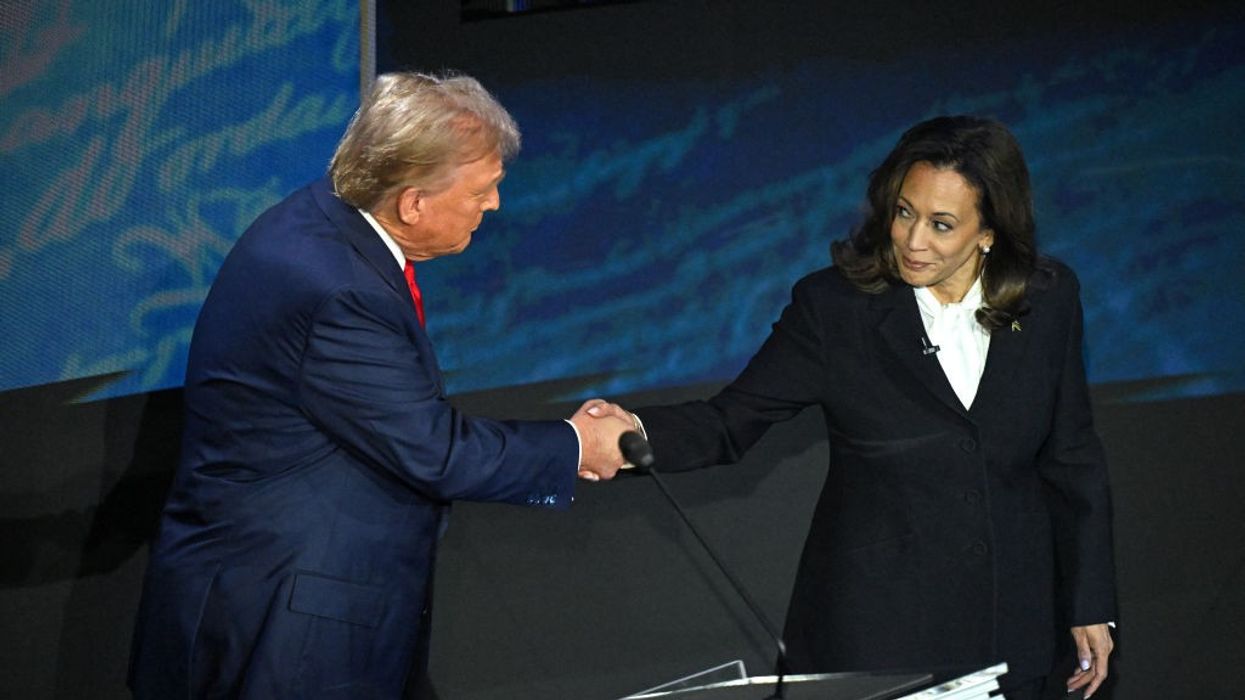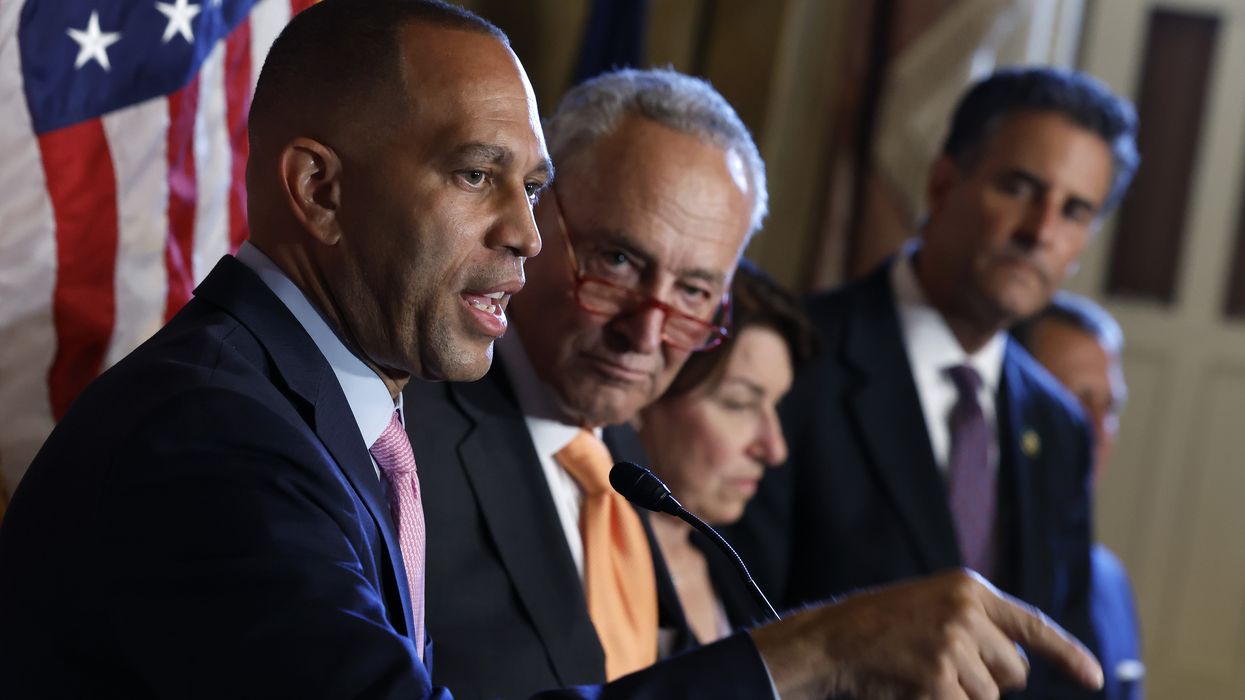The Global South's View of the Harris-Trump Race
Imperialism and hegemony still rule in the United States. But while Kamala Harris and the Democrats may have their flaws, the alternative of four years of Donald Trump is much worse.
As the U.S. elections come closer, there is growing pressure on many progressives in the Global South to make our voices heard in support of the candidacy of Kamala Harris. No act on your part is insignificant in these elections, we are told. The votes of your relatives in the United States could spell the difference in a very tight race.
The argument is fairly straightforward. Donald Trump is a threat to democracy in the United States and to the interests of the Global South as well. Harris and the Democrats may have their flaws, but the alternative, four years of Donald Trump, is worse.
Past Democratic administrations, the argument continues, may have failed to bring about a more equal society, rein in Wall Street and Big Tech, and make more progress in promoting the rights of minorities. But under the Democrats, there is at least the space to debate these failures and correct them, racism will not be given a free pass, the climate crisis will be given the urgent attention it requires, and fundamental democratic norms like majority rule in electoral contests will not be brazenly violated. Trump in power is very likely to push hard to bring the United States to the brink of authoritarian rule, if not fascism, and informally his administration’s ruling ideology will be unbridled White supremacy.
I have no quarrel with this assessment that a Harris victory would be in the interest of the majority of people in the United States. It is the claim that a Harris presidency would be better for the Global South than a Trump regime that I find questionable and worth an extended discussion.
Two Parties of Empire
Both the Democratic Party and the Republican Party have favored an expansive imperialism that has extended US corporate hegemony by force of arms. Both have mobilized the ideology of missionary democracy, or spreading the gospel of western democracy in what they consider the benighted non-Western world, to legitimize imperial expansion. And at certain historical moments, like during the debate to invade Afghanistan in 2001, both have manipulated democratic hysteria to advance the ends of empire.
The record speaks for itself. To take just the most recent examples, only one Democratic member of Congress, Barbara Lee, voted against the resolution authorizing the invasion of Afghanistan. Despite the absence of evidence that Saddam Hussein possessed nuclear weapons, the majority of Democratic senators voted to commit U.S. troops to the invasion of Iraq in 2002. And it was a Democratic president, Barack Obama, that led the campaign that, in brazen violation of the principle of national sovereignty, overthrew the Qaddafi government in Libya in 2011, leading eventually to the state of anarchy that has prevailed since then in that country.
Both the Democratic Party and the Republican Party have favored an expansive imperialism that has extended US corporate hegemony by force of arms.
Of course, there have been some variations in the ways Democrats and Republicans have conducted their empire-building or empire-maintaining activities. Democrats have tended to be more “multilateral” in their approach. They have, in other words, invested more effort in marshalling the United Nations and NATO behind Washington’s imperial adventures than have the Republicans. They have also pushed the International Monetary Fund and the World Bank to take the lead in economically disciplining countries of the global South. But the aim is simply to provide the U.S. moves with more legitimacy than would a unilateral exercise of U.S. power, that is, to clothe the iron fist with a velvet glove. These are differences of style that are minor and marginal in terms of their consequences.
Critics from the Global South have rightly pointed out that Obama’s elimination of Qaddafi with the approval of the UN Security Council may have had more “legitimacy” than Bush’s overthrowing of Saddam Hussein via his much denigrated “coalition of the willing,” but the results have been the same: the overthrow via the exercise largely of U.S. power of a legitimate government and the consequent disintegration of a society.
The Great Republican Exodus
Over the last few months, however, there has been an interesting phenomenon. More and more people who played key foreign policy roles in previous Republican administrations have declared their support for the Democratic candidate, first Joe Biden, now Kamala Harris. The most notable recent addition to the Democratic bandwagon is former Vice President Dick Cheney, who was one of the key architects of Bush Jr’s interventionist wars in the Middle East, who recently signed up to support Harris along with daughter Liz. More are expected to defect in the less than two months remaining before the elections.
There are two reasons why former foreign policy hardliners have been leaving the Republican fold. The first is that they can no longer trust Trump, who now has total control of the Republican base. In their view, Trump during his first term weakened the Western alliance that Washington created over the last 78 years by speaking badly of allies and demanding they pay for U.S. protection, declaring the Republican-sponsored invasion of Iraq a mistake, and crossing red lines that the U.S. Cold War elite put in place, the most famous being his stepping across the Demilitarized Zone (DMZ) in Korea to talk to Kim Jong Un. More recently, he has repeatedly suggested disapproval of U.S. and NATO support for Ukraine in its war with Russia, while his running mate JD Vance, wants to eliminate aid to Kyiv altogether.
Trump, these Republican deserters feel, is not interested in sticking to the cornerstone of the bipartisan consensus that the U.S. elite, despite their sometimes rancorous quarrels, have adhered to: expanding and maintaining a “liberal” empire via free trade and the free flow of capital—an order promoted under the political canopy of multilateralism, legitimized via an economic ideology of globalization and a political ideology of liberal democracy, and defended by a Western military alliance at the center of which is American power. They worry that Trump is playing to the not insignificant part of his base, pesonified by Vance, that is tired of bearing the costs of empire and see this as one of the key causes of America’s economic decline. They know that what makes “Make America Great Again” (MAGA) attractive to many people is its promise to build a Fortress America that is much, much less engaged with the world and focused on rebuilding the imperial heartland. They are apprehensive that under Trump, the multilateral institutions through which the United States has exercised its power, NATO and the Bretton Woods institutions, would be allowed to wither away. They fear that selective, pragmatic deal-making, like the one Trump tried with Kim Jong-Un, Xi Jinping, and Vladimir Putin, would, instead, become the norm in U.S. diplomacy and unilateral military action rather than allied initiatives via NATO would be the principal means to coerce and discipline the Global South.
The other reason hardline Republicans are engaging in the once-despised practice of crossing party lines is that the Biden administration is now carrying out the kind of aggressive militarized foreign policy once associated with the Bush Jr administration in the Middle East in the 2000s. Biden has given full-throated support to Israel, which the hardline Republicans have sanctified as the only reliable ally in the Middle East, followed Bush Jr’s policy of isolating Russia by supporting Ukraine, reinvigorated NATO after Trump’s morale-sapping bad-mouthing of U.S. allies and expanded the alliance’s reach to the Pacific, and mounted the full-blown containment of China that Bush Jr and Cheney wanted to carry out but had to shelve owing to their need to win Beijing’s participation in their administration’s “war on terror.”
Biden has, in fact, taken the containment of Beijing beyond Trump’s approach of curtailing trade and technology transfers by carrying out the aggressive military encirclement of China. He has done what no other American president had done since the historic 1979 Joint Communique articulating Washington’s “One China Policy,” which is to explicitly commit Washington to a military defense of Taiwan. He has ordered the U.S. Navy to send ships through the 110-mile-wide Taiwan Strait to bait Beijing and deployed five of the 11 U.S. carrier task forces to the Western Pacific. Not surprisingly, his gestures have given the green light to worrisome bellicose rhetoric from the top military brass, like the statement of General Mike Minihan, chief of the U.S. Air Mobility Command, that, “My gut tells me we will fight in 2025.”
That the Democratic party elite now has a monopoly of promoting expansive imperialism was in full display during Kamala Harris’s acceptance speech during the Democratic National Convention on August 23, when she accused Trump of abdicating American gobal leadership, seeking to abandon NATO, and encouraging “Putin to invade our allies” and “do whatever the hell they want.” Republican defectors like Cheney and daughter Liz could only cheer when Harris promised to make sure the U.S. armed forces would be “the most lethal fighting force in the world” and committed herself to making sure “that America, not China, wins the competition for the 21st century.”
Two Paradigms of Empire…
In sum, what we have in contention on November 5 are two paradigms of empire. One is the old Democratic/Republican expansionist vision of empire that seeks to make the world safe for American capital and American hegemony. The opposing view, that of Trump and JD Vance, his vice presidential pick, considers the empire overextended and proposes an “aggressive defensive” posture appropriate to a superpower in decline. The MAGA approach would disengage from what Trump has called “shithole countries”—meaning most of us in the Global South—and focus more on walling off the core of the empire, North America, from the outside world by radically restricting migration and trade, bringing prodigal American capital back, dispensing with what Trump considers the hypocritical exercise of extending foreign aid and exporting democracy, and abandoning with a vengeance all efforts to address the accelerating global climate crisis (preoccupation with which he considers a fetish of effete liberalism).
As far as the exercise of force is concerned, the MAGA approach would most likely be in the Israeli style of periodic unilateral strikes against selected enemies outside the wall to keep them off balance, without consulting any allies or giving a damn for whatever havoc they cause.
If these are what are on offer in the November 5 elections, then it would be foolish for us in the Global South to take sides since both paradigms are detrimental to our interests.
From Helpless Hostages to Decisive Actors
Still, some say, you have to cut the Democrats some slack. In terms of their composition, Democrats and the Republicans are not, strictly speaking, twin sides of the same imperial coin. Owing to the constraints of the U.S. electoral system, there is a large contingent of progressives whose only political home is the Democratic Party. In terms of values, these folks are our allies. They have more in common with us than with their party’s elite, and they have been, for the most part, ignored and taken for granted by the latter, whose attitude towards them can be summed up as: “You have no choice but to support us.”
This view has merit. But the problem is that, so far, most of these progressive Democratic supporters have passively accepted Harris’ and the party elite’s imperial rhetoric and gestures, like Harris’ refusal to grant the rather modest request of giving a pro-Palestinian Democrat a speaking slot at the Democratic National Convention
My sense is that the progressive bloc in the Democratic Party probably underestimates its strength. In the circumstances surrounding these elections in particular, they can transform themselves from helpless hostages to awful policies to significant actors that can force Harris and the party elite to think twice or thrice about embracing the rabidly imperialist platform that Harris enunciated at the convention—but only if they’re bold enough to act on their convictions, like Rep. Barbara Lee did in casting the sole dissenting vote against the war in Afghanistan, an act of great courage that history has vindicated.
Progressive Democrats should realize that the only way to get the party elite to listen and change tack is to organize themselves and like-minded voters to abstain from voting if Harris does not retreat from her imperial platform—which, in a tight race, could effectively throw the elections to Trump. If I understand it correctly, this was the approach that the Uncommitted Movement from Michigan originally planned to follow to force Biden to reverse his pro-genocide policy in Gaza. This strategy is risky, but it can work if the party elite gets the message that the progressives are determined to carry out their threat. Fortune has never rewarded the timid. This is the only way to get the party elite to begin to change course. Otherwise they will act like they’ve always acted, from Clinton to Obama to Biden, which is to take your support for granted and run over you.
Democratic Party progressives have less than two months to go until election day to organize and prove that a Harris presidency would represent less of a threat to the interests of the Global South than a Trump-Vance regime. Unless we get clear proof that Harris has backtracked from her rabid and bellicose imperial posture, we in the Global South would be well advised not to take sides in this dogfight between rival parties of empire.


